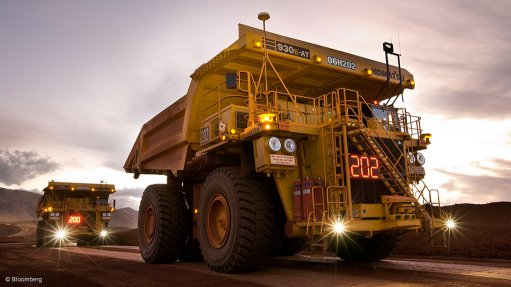
LACK OF INVESTMENT CAPITAL The slowdown experienced in the South African mining industry has meant that consumers will pay higher import prices for yellow metal
The South African mining slowdown that resulted in an 8% decline in mining and construction equipment sales between January and November last year is set to continue this year owing to the weak rand exchange rate, coupled with escalating operating costs and weak commodity prices, Standard Bank vehicle and asset finance head Sydney Soundy tells Mining Weekly.
The 8% drop last year, compared with the same period in 2012, is also a consequence of a waning construction sector in South Africa, labour uncertainty on the country’s mines, and a Chinese economic slowdown, which has subsequently undermined commodity prices.
As a result of this slowdown, Soundy says, South African yellow metal distributors have been looking north, to other African markets, in trying to counter the chal- lenging conditions in South Africa, as half of the country’s platinum mines and nearly 60% of its gold producers are currently in a lossmaking position.
The exchange rate deterioration has meant higher import prices for yellow metal, which, combined with a weaker demand, have prompted some local miners to extend their replacement cycles and postpone or cancel major projects requiring such equipment.
Further, competition for market share will intensify, as local premium-brand distributors will have to compete with Chinese yellow metal distributors entering the country with cheaper products.
“As new entrants move in and begin establishing supplier networks of their own, South African buyers of yellow metal will have an opportunity to buy from nontraditional suppliers,” says Soundy.
While this is good for consumers of yellow metal, as it ensures that local suppliers provide cheaper options that can compete in price against well-established brands, Soundy highlights, the long established premium-brand distributors will have to evaluate their pricing structures to ensure that they remain competitive in South Africa during this time.
Although the South African economy has been negatively influenced by developments in the mining sector, decreased demand for some commodities and operational-cost increases that have reduced demand for capital equipment sales in the rest of Africa are continuing at respectable levels, says Soundy.
However, even with the slowdown in South Africa, international suppliers of heavy capital equipment, such as graders, bull- dozers and other earthmoving equipment, are still using South Africa as a springboard into the rest of the continent, where demand for these machines remains strong.
There is increased demand for surface and underground mining equipment in Namibia, Botswana, Angola, Zambia and Mozambique, where major infrastructure projects, such as the building of refineries, dams, mining infrastructure, ports, roads and railways, are providing the impetus for equipment sales.
Standard Bank business banking Africa head Andrew Robertson adds that established suppliers of yellow metal still have the upper hand in Africa, as they have dealer networks and technical support to service clients in many areas of the continent.